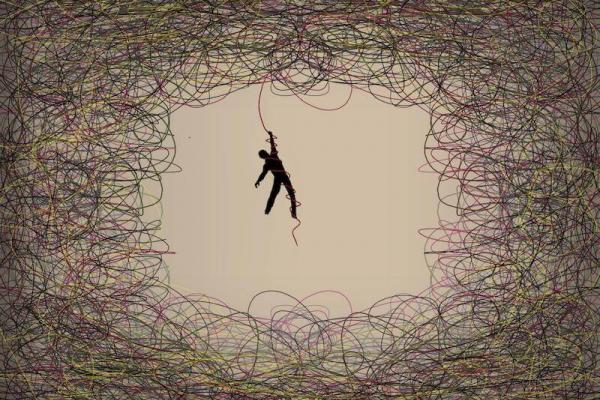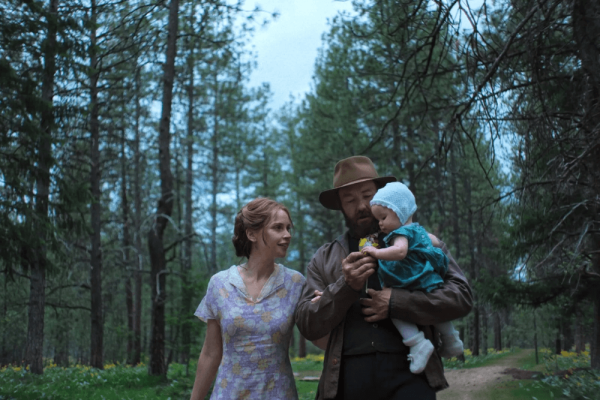Among Christians in the U.S., “deconstruction” is often associated with an exit from white evangelical formulations of the Christian faith, although many of the loudest voices in this movement are white men. So when I first heard the phrase “deconstructing my faith” at the start of 2020, I didn’t feel like it concerned me. At the time, my own paradigm had been carefully constructed through years of indoctrination in evangelical Christianity. I saw the world through a veil of optimism: I believed that disaster could be mitigated with a worship song and our purpose as Christians was to live in obedience to God’s perfect will.
Evangelicalism gave me an opportunity to feel like I could belong, even though it conflated Christianity and whiteness. This feeling of belonging appealed to me as the daughter of Asian immigrants who were often deemed “perpetual foreigners.” Grafted into this tradition, I subconsciously internalized oppressive ideologies, believing in my own inferiority and the inferiority of my cultural traditions. Writer Sarah Ngu has shown how anti-Asian racism has become so deeply embedded in white evangelical Christianity that it is difficult to imagine evangelicalism existing outside of these oppressive paradigms.
My own decision to start the deconstruction process had less to do with being won over by intellectual arguments and more to do with experiencing incomprehensible grief. Early in the pandemic, I realized the evangelical tropes about God’s goodness and God’s divine plans would no longer help me cope with tragedy. Within a span of eight months, three of my partner’s cousins — all under the age of 40 — died; our newly renovated home was destroyed in an accident, forcing us to live out of suitcases in various family members’ homes; I experienced a failed pregnancy.
Outside, we watched as the COVID-19 death toll climbed all across the United States. Prioritizing “religious liberties” and “individual freedom,” the Trump administration rolled out a haphazard response to the pandemic. We felt uncertain about how long we would suffer in isolation, all while reckoning with a rise in climate-induced natural disasters, the continued violence of police against Black folks, and an uptick in anti-Asian violence toward women and elders.
I developed an unshakable anxiety. My therapist said it was as if I was bracing for impact at any moment. She was right: I was quickly losing faith in the God of evangelicalism, and without this God, the world became a cruel place. Yet, at the same time, this “good” God — upon whom the legacy of the Christian church in the United States was built — had justified slavery, the genocide of Indigenous communities, misogyny, and Western European definitions of what is good, beautiful, and human. How could I have ever trusted this God’s goodness? A wave of anger and nausea hit me when I realized that I had been praying to a false God my whole life.
At my lowest point of despair, I received healing from voices I had learned to discount. Instead of turning to the pantheon of white spiritual leaders, I listened to marginalized voices who were working to liberate themselves and others. It was Asian American women, Black women, and Indigenous communities who helped nurture me out of cynicism and showed me healthier ways of relating to God and creation.
One of my guides on this deconstruction journey was public theologian and activist Christena Cleveland. Along with three other Asian American women, I read Cleveland’s e-book, She Who Cannot Be Shamed, Tamed or Contained. In highlighting images of the Black Madonna found throughout history, Cleveland’s writing helped us dismantle white supremacist images of God. Seeing God as a Black woman allowed us to see beauty in Blackness. And by redefining who is holy, this book inspired us to reclaim our identities as Asian American women who are worthy and made in the image of the divine. It was this God who lamented with us after every act of anti-Asian violence; it was this God who validated our anger and held us together.
While Cleveland’s writings guided me to reclaim my identity as sacred, science fiction writer Octavia E. Butler became my guide to reclaim my agency to partner with God in co-creating a future without oppression. After Derek Chauvin murdered George Floyd, Butler’s 1993 novel, Parable of the Sower, provided an outlet for me to process the injustice and inequality embedded in American society, which had been white-washed by evangelical Christianity. Butler’s writing gave me room to feel disappointment and rage toward God while still retaining hope in change. “God is Change,” writes Butler in her 1998 sequel, The Parable of the Talents. “And hidden within Change / Is surprise, delight, / Confusion, pain / Discovery, loss / Opportunity, and growth.” I started to challenge the evangelical notion that we are passive beings who exist to obey God’s will. I started to see the Bible as an anthology of stories about a God who identifies with the oppressed and invites people to participate in shaping the course of history.
Finally, the urban Indigenous community in Oakland, Calif., showed me how Indigenous ways can heal our world from its history of colonization — which has often been justified by Christianity. From learning the stories of my Indigenous coworkers and participating in ceremonies, prayer, and sessions with traditional healers, I saw how the way of Jesus aligns with Indigenous worldviews. I began to see how all my relations with the divine, the Earth, other people, our ancestors, and future generations weave us together in a state of mutual care and responsibility. Through our interconnectedness, we can collectively manifest new beginnings out of trauma.
Although deconstruction has been a disorienting process, I feel myself breaking free from the oppressive ideologies that locked me in static racial and gender hierarchies. It has allowed me to find value in our unique narratives as well as our partnership with God and the community of creation.
I’ve started accepting that deconstructing is less about finding security in a destination and more about sinking into a liminal space of vulnerability. I am grateful for friends on the road and find hope in knowing that I am not alone; many have traversed the paths before me, shining lights ahead on the road to our shared liberation.
Got something to say about what you're reading? We value your feedback!







